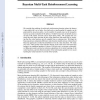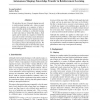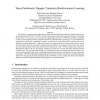688 search results - page 14 / 138 » Using reinforcement learning to adapt an imitation task |
ICML
2010
IEEE
13 years 8 months ago
2010
IEEE
We consider the problem of multi-task reinforcement learning where the learner is provided with a set of tasks, for which only a small number of samples can be generated for any g...
CIG
2005
IEEE
14 years 1 months ago
2005
IEEE
AbstractGroup utility functions are an extension of the common team utility function for providing multiple agents with a common reinforcement learning signal for learning cooperat...
ICML
2006
IEEE
14 years 8 months ago
2006
IEEE
We introduce the use of learned shaping rewards in reinforcement learning tasks, where an agent uses prior experience on a sequence of tasks to learn a portable predictor that est...
WOSS
2004
ACM
14 years 1 months ago
2004
ACM
Components in a decentralised system are faced with uncertainty as how to best adapt to a changing environment to maintain or optimise system performance. How can individual compo...
AGENTS
1999
Springer
13 years 12 months ago
1999
Springer
In this paper, we present a novel multi-agent learning paradigm called team-partitioned, opaque-transition reinforcement learning (TPOT-RL). TPOT-RL introduces the concept of usin...



